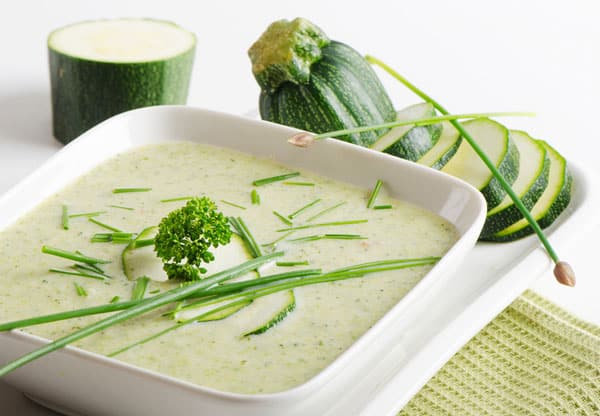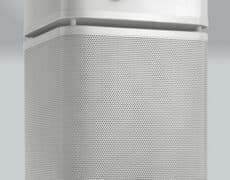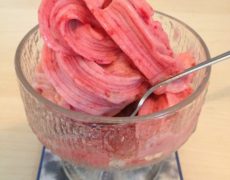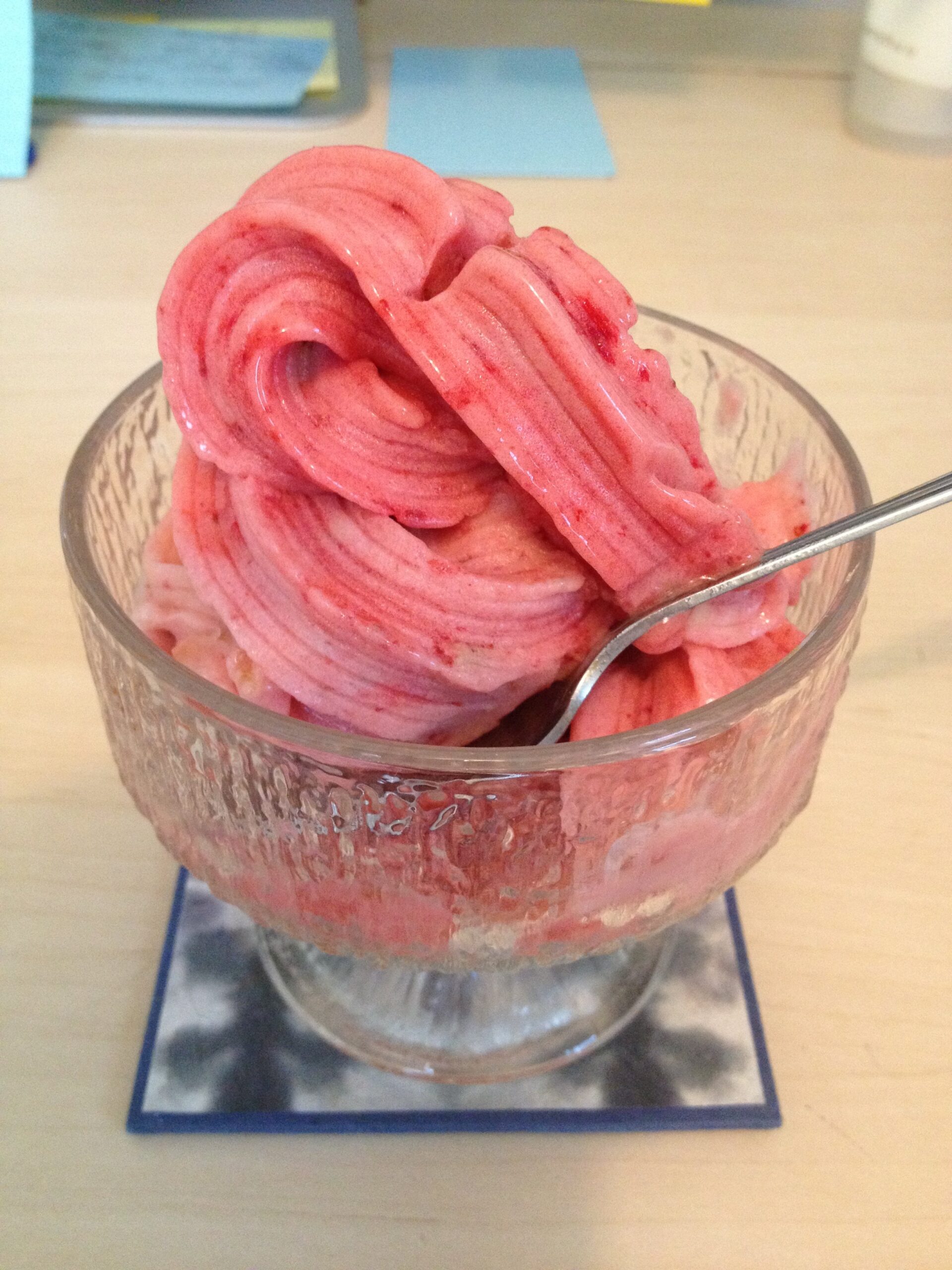Zucchini Bisque
Bisque is a special type of soup that originates from France. It has a smooth and creamy appearance and it is usually based on a broth of crustaceans. Even though the original bisque is made from langoustine, crayfish, shrimp, crab, lobster of other seafood, in the recent period many people are using veggies to prepare it.
Health benefits of zucchini
Zucchini is the Italian name we adopted in the US for summer squash, is underestimated for its health benefits and is a fabulous summer food, perfect for bisque. First of all, zucchini helps manage blood sugar levels. Furthermore, it is rich in dietary fiber and has a very small number of calories, and since fiber increases satiety, it is a perfect vegetable for a person trying to lose weight. It is 95% water, and only 14 calories per 31/2 ounces. The high content makes it particularly practical for summer (hydration), while carotenes help protect from the damaging effects of sun. It is also a cooling vegetable, perfect for a person with too much heat. In Ayurveda, it is tridoshic, meaning that it is good for anyone.
Zucchini can also help you reduce cholesterol levels. It’s also rich in vitamin C and manganese, two nutrients that provide support to the cardiovascular system and protect the heart. Zucchini is especially effective in preventing atherosclerosis and diabetic heart disease.
In a study, juice of zucchini equaled the juices made from pumpkin seeds, leeks and radishes in their ability to prevent cell mutation, which means it is also a good cancer fighter.
Health benefits of basil and how to grow it
Basil my true love. How many times will I go to a local Vietnamese restaurant for the Pho rice noodle soup (I pick a vegetarian broth personally) and rejoice at the pile of Thai basil landing in front of me….I devour it all and may even ask for an extra serving. Truly, life without basil would be lacking. I am, of course, very excited to share some benefits of basil here with you!
Did you know that basil is actually a native to India, Africa and Asia and it meant royal in Greek? It is a symbol of love In Italy. It was used in embalming bodies in ancient Egypt too. Basil is a mosquito repellant. I wonder if I could buy essential oil of basil, make a tincture out of it and spray it on my legs and arms, so I can finally enjoy being out in nature in summer without being devoured by mosquitos. Basil contains different minerals that can help people relieve stress, insomnia, fatigue, or cough, improve the immune system, mild depression, menstrual pain, enhance vision, prevent acne, and ease headaches. It has been used in China for spasms of the intestinal tract, kidney ailments and poor circulation.
Basil has important anti-cancer properties: studies found that it contains orientin and vicenin, two flavonoids that protect cell structures as well as chromosomes from radiation and free-radical damage. Basil is rich in manganese, calcium, copper, magnesium, iron, omega-3 fatty acids and vitamins C, A and K. In Ayurveda, basil reduces kapha and vata while it is still ok in moderation for pitta.
In order to grow basil, you will first have to select the right type of basil. The best option is to start the seeds inside your home because these seeds are fragile in the beginning. Use small metal seed containers filled with peat, vermiculite, and perlite. Keep the seeds wrapped with plastic layer until you notice the first tendrils. Of course, remove the plastic layer when you water the seeds (two times a day). Basil requires a lot of sun, so it may do well inside a house on the windowsill.
Storing basil
Fresh basil should be lightly rinsed and stored in he fridge wrapped in a slightly damp paper towel for up to one week. You can also freeze it, either whole or chopped, in airtight containers. Fresh basil can also be chopped or blended with olive oil and stored in the fridge or freezer. Frozen, it will be good for three months. Some people fill ice cubes with basil/olive oil and use that to add to a salad dressing as needed.
Enjoy this Zucchini Bisque! Looking for more recipes with functional nutrition benefits? Follow me on Pinterest!

Ingredients
- 1 tablespoon of olive oil
- 1 ½ cups of chopped onion
- 3 cloves of garlic, minced
- 4 cups of vegetable stock
- 1 large zucchini, shredded
- 2 tablespoons minced fresh basil
- ½ teaspoon grated nutmeg
- Celtic Sea Salt
- Black Pepper
- 1 tablespoon lemon juice
- Basil, freshly chopped
- Feta Cheese (optional)
Instructions
- Heat the oil in a 1 quart saucepan over medium heat. Add the onion, stirring occasionally for 5 minutes, or until soft but not brown. Add the garlic and cook for 1 minute.
- Add the stock, zucchini, basil, nutmeg, salt and pepper if using, and cook for 15 minutes.
- Let cool for 10 minutes. Ladle half the soup into a blender and blend until pureed. Pour the blended soup into a large bowl. Repeat with the remaining half. Stir in the lemon juice.
- Garnish with feta and freshly chopped basil. Soup may be at room temperature or slightly chilled.
LEAVE A COMMENT
If you want to transform your life, if you want health and wellness, if you want peace of mind, there isn’t a better investment than working with Kasia.~ Beth























1 Comments
Posted on August 31, 2018 at 11:07 AM by Joanne Kines
I bought a hand spiralizer this summer which I have been using to make zucchini “noodles’ to use instead of pasta
Goes well with fresh tomato and pesto sauces
Also do cucumbers and onions with a chilled vingerarette
You can spiralize so many other vegetables to add fiber and nutrition: beets, sweet potatoes, broccoli stems, beets, and other root vegetables
Also putting cauliflower in the food processor to make “rice”
Makes a great tabouleh salad and a base for Asian dishes